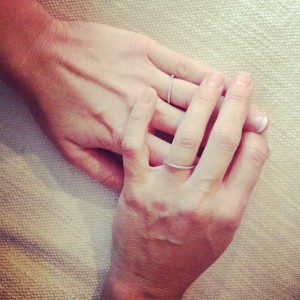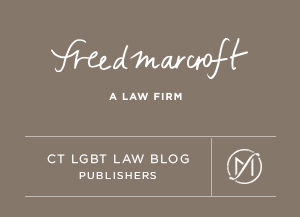Are Civil Unions from Other States Recognized in Connecticut?
 Kristen recently wrote about what happened to same sex couples who had entered into Connecticut civil unions before marriage was available in Connecticut.
Kristen recently wrote about what happened to same sex couples who had entered into Connecticut civil unions before marriage was available in Connecticut.
Now we turn to the question of whether a civil union entered into in another state or foreign jurisdiction will be recognized in Connecticut.
In some cases, this question arises when a Connecticut same sex couple entered into a civil union in the state in which they previously resided because marriage wasn’t available to them in that state. In other cases, for ideological or personal reasons, a Connecticut same sex couple chose to enter into a civil union outside of Connecticut rather than enter into a marriage in Connecticut.
A short background on Connecticut marriage equality law, and more specifically the transition from civil unions to marriage, is available here.
On April 23, 2009, the Connecticut Governor signed into law Public Act 09-13, “An Act Implementing the Guarantee of Equal Protection Under the Constitution of the State for Same Sex Couples,” which clarified that if you have a civil union (or registered domestic partnership) from another state, Connecticut will grant you the same rights and benefits, and hold you to the same responsibilities, as a married couple in Connecticut.
More specifically, under Connecticut General Statutes §46b-28a:
A marriage, or a relationship that provides substantially the same rights, benefits and responsibilities as a marriage, between two persons entered in to in another state or jurisdiction and recognized as valid by such other state or jurisdiction shall be recognized as a valid marriage in this state, provided such marriage or relationship is not expressly prohibited by statute in this state.
So, generally, couples who have a civil union from another state are considered married in Connecticut.
But that’s not the end of the inquiry, especially when it comes to the question of whether that couple is entitled to federal recognition of their civil union.
In June 2013, in United States v. Windsor, the United States Supreme Court struck down a central section of the so-called Defense of Marriage Act, which excluded same-sex couples from marriage – and from the 1,100 protections and responsibilities that marriage triggers at the federal level. However, the Windsor court did not extend the same federal rights and responsibilities to committed gay couples who enter into civil unions or domestic partnerships.
As a result, couples who have a civil union — even if their home state of Connecticut considers it a marriage — will not have any of the protections or responsibilities federal law provides to married couples.
Federal protections include social security survivors’ and spousal benefits, federal veterans’ spousal benefits, immigration rights associated with marriage, federal spousal employment benefits, the right to file joint federal tax returns, exemptions from income tax on your partner’s health benefits, the federal exemption from inheritance tax, and many other federal protections which are denied same-sex couples whether legally joined in a civil union or a civil marriage.
In addition, states other than Connecticut may not recognize the legal status of your civil union. This means that when a couple with a civil union travels or moves to another state or country, their union may not be recognized. As a result, couples should considering consulting with an attorney and taking certain precautions before they travel, such as executing healthcare and financial powers of attorney, and carrying them with them.
Meghan Freed and Kristen Marcroft publish the Connecticut LGBT Law Project as a resource of legal news and commentary for the Connecticut lesbian, gay, bisexual and transgender community and their friends, families, and allies.
At their law firm, Freed Marcroft LLC, Kristen and Meghan practice estate planning, family, real estate, litigation, business and non-profit planning, and immigration law in the historic Linden building on Main Street in Hartford, Connecticut. The attorneys’ practice is welcoming to all Connecticut individuals, families, and small businesses, especially including same sex couples and members of the lesbian, gay, bisexual, and transgender communities.

